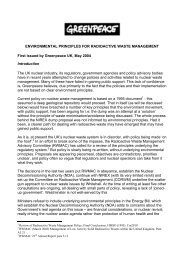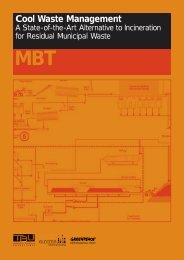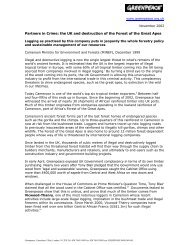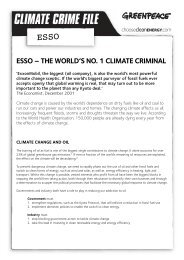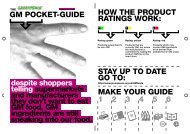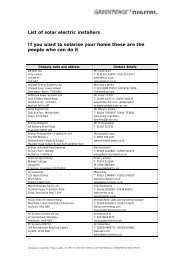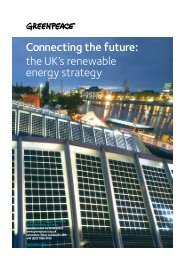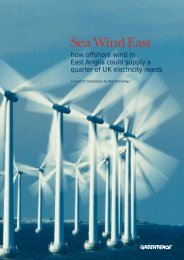EXXON'S WEAPONS OF MASS DECEPTION - Greenpeace UK
EXXON'S WEAPONS OF MASS DECEPTION - Greenpeace UK
EXXON'S WEAPONS OF MASS DECEPTION - Greenpeace UK
Create successful ePaper yourself
Turn your PDF publications into a flip-book with our unique Google optimized e-Paper software.
any commitment to legally binding emissions targets within the next decade<br />
would entail large costs. This model omitted to factor in the economic (never<br />
mind the environmental and human) costs of inaction or delay on climate<br />
protection, nor did it incorporate the possibility that new markets and jobs<br />
could be created through emissions reduction policies and renewable energy.<br />
While these omissions are not surprising given who funded the work, it is<br />
rarely cited with any reference to the API. The author of the model, David<br />
Montgomery, spoke at a briefing organised by the US Council for<br />
International Business and chaired by the head of the International Chamber<br />
of Commerce (see below) at the UN climate negotiations in Geneva in<br />
December 1996.<br />
• International Chamber of Commerce - An industry lobby group that was active at<br />
COP 6 in The Hague, November 2000. ExxonMobil’s Chief Scientific advisor,<br />
Brian Flannery, is one of their main spokespeople.<br />
• US Business Round Table - The BRT is made up of CEOs from over 200 large<br />
corporations, including ExxonMobil. The agenda it pushes calls for global<br />
climate agreements that include developing countries, voluntary agreements<br />
for industry, ‘flexible policies’ and tradable emissions permits between<br />
countries. Tax and regulatory measures are strongly opposed. Its 1997<br />
position statement proposed that ‘ a climate policy which fails to include all<br />
nations should be opposed.’<br />
• Global Climate Information Project - In the run up to Kyoto in 1997, this industry<br />
coalition ran a $13m advertising campaign in the US press, national and local<br />
TV and radio. It was sponsored by both the API while Lee Raymond was chair<br />
and the GCC.<br />
• US Council on International Business - ExxonMobil is a member of this corporate<br />
lobby group that actively supported Bush’s rejection of the Kyoto protocol.<br />
• International Petroleum Industry Environmental Conservation Association - At the<br />
December 1996 climate talks, the IPIECA circulated a briefing paper which<br />
concluded: ‘Current proposals for near term (10-20 years) emissions<br />
reductions in developed countries, which imply curbs on fossil fuel based<br />
energy use, would result in substantial costs that would inhibit economic<br />
growth and negatively affect trade, investment, competitiveness, employment<br />
and lifestyles.’ Exxon and Mobil where both members at this time.<br />
CHAPTER FOUR: THE DIRTY WAR – REPRESSING INTERNAL<br />
DISSENT BEFORE RESOLUTION 98 AND KYOTO<br />
The argument ExxonMobil uses again and again in order to try and prove its case<br />
both on the legitimacy of its economics and the long-term position of the US<br />
government, is the 1997 Senate Resolution 98. The vote went 95-0 in favour of a<br />
resolution by Senators Hagel and Byrd recommending that the US should not sign<br />
an international agreement on climate unless it contained specific new commitments<br />
for developing countries. The vote was preceded by extensive lobbying by Mobil,<br />
and by the Exxon trade and lobby front groups detailed in this dossier in favour of


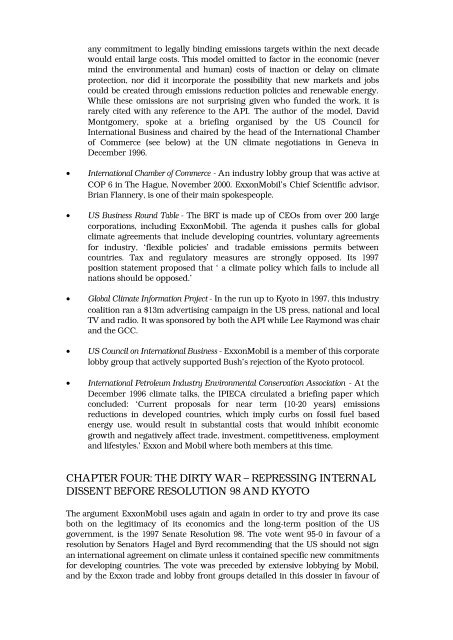
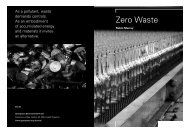
![[2007] EWHC 311 - Greenpeace UK](https://img.yumpu.com/22079793/1/184x260/2007-ewhc-311-greenpeace-uk.jpg?quality=85)

